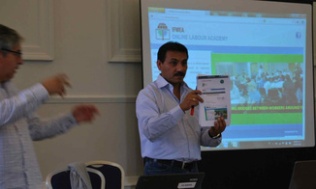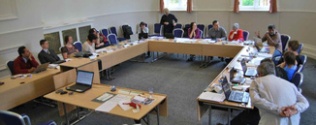The Online Labour Academy (OLA) from the International Federation of Workers’ Education Associations (IFWEA) is an e-learning platform for adult and labour education that provides an online curriculum, which can also be adapted for face-to-face workshops thus combining distance education and interactive learning for labour organizations to utilise in their education activities.
From the 29th of February to the 2nd of March of 2012 the key stake-holders of the Online Labour Academy met in Cabo, South Africa to establish the base strategy and to plan the pilot of six online courses’ curricula and roll out. Participating organizations during this process were:
- The International Federation of Workers’ Education Associations (IFWEA, South Africa)
- The Labour Research Services (LRS, Africa)
- Labour Education and Research Network (LEARN, Philippines)
- International Transport Federation (ITF, Global Union)
- Programa Laboral de Desarrollo (PLADES, Peru)
- The Self Employed Women’s Association (SEWA, India)
These participating organizations delivered six courses to selected trade union and membership organization leaders. To make the execution of these courses possible, a learners and tutors guide for the use of OLA was developed and a learner recruitment selection took place where as a follow-up the learners got recruited. Afterwards the participating organizations shared this knowledge with local partners in their countries and regions of interest. PLADES coordinated this process, following the IFWEA plan of a pilot programme with six online courses.
After developing the platform, The Online Labour Academy pilot was launched in 2012 in Stockholm, Sweden. The tutors for the online courses got trained in order to develop the basic skills to manage the OLA platform. With this training the tutors of the organizations got involved to launch the pilot programme courses scheduled in February. PLADES accompanied the process and provided technical assistance to organizations that needed it.
Starting in August of 2012 the online courses took Place. All in all, 121 online learners from the labour movement completed courses such as “Building Democratic Trade Unions”, “Communication for Advocacy”, “Basic Information and Communication Skills for Collective Bargaining”, “Climate Change and Transport Workers” and “Youth Globalisation Awareness Programme”. The Self Employed Women’s Association (SEWA) did the same course with four tutors in four villages at the same time using online and group participation methodologies.
By the end of 2012 the transfer of skills from the labour support organizations to the trade unions was in place in four countries and in two international organizations. Participants of four countries got trained in collective bargaining and the participants of eight countries in climate change. Participants of four countries got trained in the subjects of representing and advocating the needs of women working in informalized forms of work and tutors from four countries, two international organizations and the IFWEA secretary got trained in distance learning. At this point six IFWEA member organizations and the IFWEA secretary offered online education. In total, 102 trade union learners participated in 7 courses in the year 2012.
The biggest lesson learned during this year was of the value of participative planning, development and monitoring of the project. Trying to get full participation has resulted in a slight delay in the roll-out of the courses for 2012 and over expenditure of the travel budget for the year.
In February of 2013 the pilot experience got evaluated. At that meeting the participating organizations agreed that a second workshop of tutor training was necessary. Two other organizations, CLASS Nepal and CENAC Bolivia joined the Online Labour Academy at this point. It was agreed that this workshop should seek to capture the experiences of the participants and strengthen their knowledge, skills and abilities to effectively manage online courses implemented by the organizations.
The workshop was held in May of 2013 in London. The training was attended by OLA tutors who are going to deliver their second course of online training this year. Of these the courses “Building Democratic and Women Friendly Trade Unions» of CLASS Nepal as well as the course “Advocacy for Decent Work” of CENAC Bolivia already took place. The trainers from PLADES, Juan Carlos Vargas and Hernán Benites, designed the training in London to:
- update the information and knowledge on the OLA platform
- to create tutors capable of training online tutors themselves
- promote the autonomy of tutors
The training covered the themes of:
- User Administration
- Course Configuration
- Contents Administration
- Evaluation and Reports
At the end of the training there was agreement on the basic elements of pedagogical approach, knowledge on the OLA platform was updated and a new tutor guide was developed.
At the Review Workshop in August of 2013 at Kathmandu current participants of the course “Building Democratic and Women Friendly Trade Unions” from CLASS Nepal and former participants of the course “Building Democratic Trade Unions” from the Labour Education Foundation (LEF, Pakistan) have shared their learning process and outcome through a video conference between two countries.
The course “Building Democratic and Women Friendly Trade Unions” contains 24 topics and is designed for six weeks. The participants of the course will be enriched at the end of the course with the theoretical knowledge of democracy and creating forums to organize more working women into trade union movement.
The educational work on the Online Labour Academy now reaches countries such as Peru, South Africa, Uganda, Philippines, Pakistan, Great Britain, Finland, Sweden, Norway, Kenya, Mauritius, Malawi and India. Learners have already given feedback about what they want to learn next.[1]


